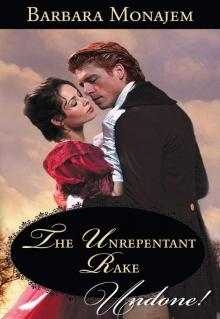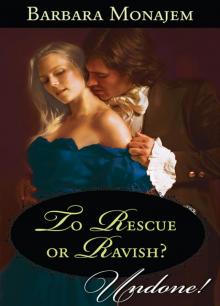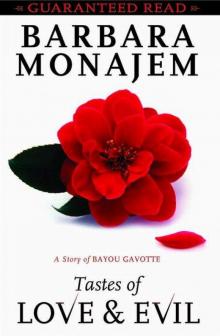- Home
- Barbara Monajem
Love and the Shameless Lady (Scandalous Kisses Book 3) Page 25
Love and the Shameless Lady (Scandalous Kisses Book 3) Read online
Page 25
“Christ. Insult added to injury. Too bad he’s dead, for I wish I could gut him.”
“I don’t feel boring.” Tears glistened in her eyes.
“Because you’re not. You’re brilliant, and I adore you.”
“That’s very kind of you,” she muttered, dashing the tears away.
“It’s not kindness. It’s the truth.”
Her bosom rose and fell in the candlelight. She gave him the ghost of a smile. “I got in the last word, though.”
He snorted. “Why am I not surprised?”
“I advised him to leave the area, if not the entire country, as soon as possible, for when my brother found out what he’d done to me, he would surely kill him.”
“Rightly so.”
“I slammed the door and went downstairs and into the coffee room full of patrons. I was stark naked but too upset to care. Sally, bless her, pulled me into the kitchen and helped me dress, then got me safely to the stable and my horse. I managed to get home unseen, but I knew it was hopeless. Reggie was sure to spread the word far and wide that he’d deflowered me, and that I was a bore in bed.”
“But he didn’t, of course.”
“There’s no of course about it, although I never did find out what he’d told everyone. I wasn’t about to ask Sally or anyone else for details. I confessed to Mama the next morning. She tried to cast me out of the house forever, but I told her she couldn’t, because Colin was master. She ranted and raved, and I didn’t blame her, but I refused to leave. I never tried to pretend I was ashamed of my behavior. I was furious at myself for being a stupid little ninny, but never ashamed.”
“No, why should you be?”
She shook her head, her expression incredulous. “That same day, she had her first apoplectic fit. She couldn’t speak after that.”
“Which certainly solved the problem of too much talking.”
Daisy started to speak, but her voice caught on a sob.
“Pardon my making game of it, but she sounds like a dreadful female. Did she really never speak to Colin after your sister died?”
“No, never.”
“You have turned out remarkably well in spite of her.”
Daisy sniffled. “I liked my father, but I was very young when he died. I still remember him fondly.” She opened a drawer in the dressing table, found a handkerchief, and blew her nose. “Mama declined after that first apoplectic fit. She had another several months later and was dead in under a year.” Daisy made a rueful face. “I don’t know why I took exception to Philippe dropping his servant down a hole. I killed my mother, after all.”
“Nonsense. She would have died sooner or later anyway.”
“But I hurried it along. Colin came home after a few weeks, but by then I’d gone. I couldn’t tolerate the neighbors refusing to acknowledge my existence, and the servants looking at me as if I were a whore. The injustice of it infuriates me and still does. A man can bed any number of women—in fact, it’s seen as a measure of prowess, while a woman . . . But I don’t wish to talk about that. I stole one of Colin’s dueling pistols, a knife that had belonged to my father, and fifty pounds from the strongbox, and went to live at the Diving Duck. Luckily, Reggie had taken my advice and left Lancashire.”
“But he died anyway.”
“Yes, in a brawl. Colin tried to persuade me to come home, but I was happier at the Diving Duck. Sally is a dear, good friend, and the common people, the really common ones, not the merchants and mushrooms, are not so fussy about propriety. They are kind to me, and after a while they learned not to treat me like a lady. And of course the regular money helps the inn. Colin gives me an allowance that more than covers my room and board, my clothing, and everything else I can possibly need.”
She clasped her hands together. “So now you know, and you understand why you needn’t marry me.”
Daisy steeled herself for the final rejection.
“For perhaps the hundredth time,” Julian said, “I want to marry you.” He stood and held out a hand.
She clasped her hands tightly, ignoring his outstretched one. “Why?”
“Because I love you.” He dropped his hand. “For so many reasons that I can’t list them all. Your courage in adversity. Your intelligence, which you use in such worthwhile ways—writing, cookery, and who knows what else you might choose to do? Your forthrightness, which means I can be forthright, too. Do you have any idea what a comfort that is to me? Your beauty and vivacity—” He broke off. “What’s wrong, sweetheart?”
Why must he make her say it again? She forced the words out. “But I’ll be boring in bed.”
He shook his head. “Listen to me. Your Reggie was . . . abnormal, I believe. He was still erect after an hour inside you, correct?”
“Yes, I told you.” She paused, frowning. “Why, isn’t that usual?”
“God, no. Ten minutes maybe, longer if it’s the second or third go round.”
“Second or third go round?” That sounded appalling.
“Only if both lovers want it,” Julian said. “Sweetheart, the problem wasn’t yours, it was his.”
She twisted her hands together. “What do you mean?”
“I can’t say for sure, but it sounds to me as if he couldn’t reach completion. That explains his anger and frustration. He thought perhaps doing it with a lady would excite him enough, but it didn’t help. He didn’t boast of his conquest because he was ashamed of his own inadequacy, and perhaps out of fear of your brother, too.”
“You mean . . . if I’d kept my mouth shut, my mother might never have known?”
“Possibly, depending on whether or not people at the inn gossiped about seeing you there.”
“They wouldn’t have wanted to run afoul of Colin either.” Daisy pondered that. “I might never have been known as a ruined woman.”
“But you also might not have written those books or learned to cook and bake.”
“That’s true.” How amazing. Reasons to be grateful for her own folly. “Thank you for pointing that out.”
“Come, give me my ten minutes now.” Julian tossed his shirt over his head.
She blinked, taking in his broad chest with a smattering of fairish hair. He was very good to look at. He began to unbutton his fall.
“Although to tell the truth, I might not make it past two minutes,” he said. “I haven’t been with a woman in months, and I want you so badly it hurts.”
He dropped his breeches and then his smallclothes, and his erect penis jutted out.
She bit her lip. Hard.
He chuckled. “As far as I know it’s perfectly normal and not extraordinary as to size. I assure you, we will fit together perfectly.”
Yearning suffused her, filled her to bursting. She believed him. Almost. If they did fit together, if she didn’t hate it, and if he didn’t find her boring, perhaps she would be able to marry him. It was too much to hope for, but she now knew, just looking at him, that she would no longer have the strength to refuse.
Shakily, she began to unbutton her nightdress. “This feels almost like a wedding night.”
“In a way, it is. You are, in every way that matters, a virgin, and I’m the lucky man privileged to make you his own. Of course, we’ll do this again on our official wedding night. And before and after that, too.”
His enthusiasm was infectious. Incredibly, she found herself smiling.
He lifted her nightdress, and she raised her arms to help him take it off. He stopped.
“What?” She couldn’t see with the fabric covering her face. “Why did you stop?”
“I’m feasting my eyes on your breasts.” She adored the laughter in his voice. Adored him. A dangerous emotion for a Warren, but she didn’t care. She giggled and wriggled, and he tossed the inconvenient garment ove
r her head. Then he just stood there, gazing at her.
Heat swarmed up her, down her, from top to bottom, to the tips of her fingers and toes.
His mouth tilted into a grin. He patted her on the derriere and pushed her gently back to the bed.
And promptly began to do precisely what he’d suggested earlier. Touches, kisses, licks, a teasing suckle here, and tiny bite there. Then he moved lower.
“Oh, my God,” she cried through a throb of pleasure, “surely you won’t lick me down there!”
He raised his head. “You had no idea what those vulgar songs meant, did you?”
“I wondered, but I simply couldn’t believe much of it. And I didn’t really want to know.”
“Well, now you do.”
She laughed, and then moaned, and later, through a haze of exhausted delight, she asked, “What about your ten minutes? Or two?”
In an instant he was on her, and then inside her. He smiled and kissed her hard. “Daisy, I love you so much.”
Tears burned behind her eyes, and she wrapped her legs around him, and her arms as well, and throbbed to his every movement. She had never imagined, couldn’t have imagined, that joining so intimately would be so perfect and so right.
A while later, more than two minutes, but most likely not ten, she said, “I love you, too.”
Chapter 15
When Daisy woke, Julian was gone. Preserving the proprieties, she assumed, violently disliking all the pretense. Pretending they were engaged. Pretending they were married. Pretending they hadn’t spent the night together. Pretending the marquis hadn’t murdered his servant. Pretending he wasn’t a thief . . . It went on and on, until one scarcely knew what was real and what wasn’t.
How could Julian take it all in stride? Was he accustomed to such pretense?
A chill stole over her as she recalled once again what the marquis had said. Sir Julian is not what he seems.
She got up and pulled the bell to summon a maid, who brought a cup of chocolate and helped her to dress.
Daisy trusted Sir Julian—she had trusted him with everything last night—and she still did. Nevertheless, she knew very little about him. If he were hiding something, she had to find out what.
Don’t be ridiculous. Everyone is hiding something, if only one’s secret thoughts and wishes.
Nevertheless . . .
She had to find a time to speak with him privately. This was impossible at breakfast, but afterward she bore Julian away to the billiard room, which was empty at this time of day. “We need to talk.”
“You’re going to seduce and abandon me, brokenhearted and bereft?” His mouth twisted. “All right, no jesting. What’s amiss?”
“I’m very sorry, but it seems I don’t trust you one hundred percent.”
“Why should you? You hardly know me, and frankly, I don’t believe that anyone is completely to be trusted.”
“How . . . unpleasant. Are you warning me that you are untrustworthy?” She tried to infuse a lighthearted note into her voice. “A bit late for that, isn’t it?”
“No, I’m only saying that even the most highly principled individual occasionally slips and does something he or she later regrets.”
How very logical, but it didn’t help.
“Real people aren’t like the characters in your books, and real problems aren’t simple issues of good versus evil.” He sounded tired, and her instant sympathy blew away the mistrust, at least for the moment.
“You’re thinking of the marquis.”
“I intend to speak to him as soon as he returns from making arrangements with the vicar for Antoine’s funeral.”
“But surely he’s a Catholic, both Antoine and Philippe himself! He believed the bone in the stolen reliquary was sacred, remember?”
“Antoine can’t speak for himself anymore, and I imagine Philippe just wants it to be over with. Does it matter?”
“It may have mattered to Antoine,” she said.
He shook his head in obvious disbelief. “You’re tender-hearted even about your would-be murderer.”
“I’m not feeling tender-hearted about the marquis.”
“Understandable.” He paused. “A month ago, I would have said I trusted him with my life.”
“And now you don’t?”
Julian shrugged. “We’ve been friends for a long time, ever since he came to England. I would much rather continue to trust him, but I don’t know whether I can. It seems I don’t know him as well I thought.”
Daisy nodded glumly.
“So, what don’t you trust about me, love?” Julian asked. “Out with it, please.”
“It’s just that . . . I want to be supremely confident, like a heroine should be. I want to have complete and perfect faith in my hero. I don’t want to be swayed by the opinions of others . . . Oh, I feel like such a fool.”
“By whose opinion are you swayed?”
“The marquis! Who probably cannot be trusted, and yet . . .”
“He said something about me?”
“Yes,” she confessed. “When he locked me up under the summerhouse, he said you play the part of a quiet, scholarly gentleman, but you are not what you seem.”
Julian hesitated, and Daisy’s heart sank.
Damn. Julian felt his stomach knot. He’d hoped to avoid telling her. Hoped she need never know. Maybe she needn’t, for he wasn’t sure what Philippe had meant by that remark. But if he evaded the question until he had a chance to speak to Philippe, she would mistrust him even more.
He took her hand. “Let’s go walk in the rose garden, where there is no chance of eavesdroppers.”
She nodded. “Very well.”
They went out the French doors, just as Philippe de Bellechasse rounded the corner of the house. Damn.
Philippe’s bow was brief, his expression ironic. He accompanied them into the rose garden. “Miss Daisy, I fear I owe you an explanation. Pray accept my apologies for my man’s behavior.”
Daisy huffed. “An apology for attempted murder? As for an explanation, after all those lies you told last night, I shan’t know whether to believe a word you say!”
“Understandable, but Sir Julian is an excellent judge of character. Perhaps he will lend me credibility.”
“He has already tried,” she retorted, “and I still don’t know whether I concur in his judgment.” She put up a hand. “However, I do know what inspired me to write about a bracelet with charms that were lost and then retrieved.”
“You do?” Julian asked. “Since when? Why didn’t you tell me?”
“Since last night. I was preoccupied, as I’m sure you recall.” She blushed, then scowled fiercely, and a wave of love and longing washed over Julian. What if he lost her because of his ignoble profession?
“I remembered while I was stuck in the mosaic room,” she said. “There’s something about being imprisoned in a hole in the ground that makes one think.”
“Again, my apologies,” Philippe said.
She flapped a hand and turned to Julian. “One night at the inn, well over a year ago, I saw a sketch Mr. Bonaventure had made. It looked like a bracelet with words written at intervals along it. A rose, a goddess, and so on. Perhaps I didn’t remember because the words were French.”
“Which, at the time, I did not know you could both speak and read,” Philippe said. “I saw no cause for concern.”
“On the sketch, the name of a town was associated with each word. Since Mr. Bonaventure’s interests were political, I assumed this had something to do with history, the white rose of York, for example. But I soon forgot that, setting the idea of a charm bracelet in the back of my mind while I finished the story I was writing at the time. By the time I began The Lady’s Ruin, I’d forgotten the source of the idea. I didn�
��t memorize the combinations of charms and towns on purpose. I didn’t know they were already linked in my mind.”
“Nor that they were also linked to a scheme to steal treasures from honest men,” Julian said.
“What about the honest Frenchmen from whom they were stolen?” Philippe said. “Surely one takes a risk when buying stolen goods.”
“I thought you would say something of the sort,” Julian said. “Always so very reasonable, my friend Philippe. Pray don’t try to convince me that you stole them to return them gratis to their previous owners.”
Philippe’s laugh was mirthless. “I believe I convinced that fool Hythwick of my purity of heart. No doubt he ranted at breakfast this morning about the lunacy affecting all Frenchmen.”
“Something of the sort,” Julian said. The scene at breakfast had been quite amusing. Hythwick had lamented the inconvenience, not to mention scandal, of a violent death on the premises. Upon hearing of Antoine’s unfortunate tendre, he’d stared at Daisy in affront, rather as if she was the whore of Babylon, and admonished Julian to keep a better guard over his wife. If not for Gloriana’s rapid intercession and Daisy’s giggles, Julian would have floored him then and there. “Well?”
“Oh, I am no Robin Hood,” Philippe said. “I needed more money, Antoine wished to make his fortune, and this was one way to accomplish both our aims. But Antoine had another motive. The items we sought were all goods stolen from honest merchants and other wealthy bourgeois, not aristocrats.”
“Ah. So Antoine Breton and the Breton who auctioned them off were related.”
“How did you learn his surname? I advised him not to use it.” Philippe narrowed his eyes. “You snooped in my belongings? You left no sign.”
Julian shrugged.
“I suppose I should not be surprised,” Philippe said.
“Perhaps not.” Julian wondered in what way he had slipped up.

![[Bayou Gavotte 00.0] Back to Bite You Read online](http://i1.bookreadfree.com/i/03/23/bayou_gavotte_00_0_back_to_bite_you_preview.jpg) [Bayou Gavotte 00.0] Back to Bite You
[Bayou Gavotte 00.0] Back to Bite You The Redemption of the Shrew (Scandalous Kisses Book 4)
The Redemption of the Shrew (Scandalous Kisses Book 4) The Unrepentant Rake
The Unrepentant Rake A Lady's Lesson in Seduction
A Lady's Lesson in Seduction Love and the Shameless Lady (Scandalous Kisses Book 3)
Love and the Shameless Lady (Scandalous Kisses Book 3) The Redemption of the Shrew
The Redemption of the Shrew The Right to Remain Single_A Ghostly Mystery Romance Novella
The Right to Remain Single_A Ghostly Mystery Romance Novella The Wanton Governess
The Wanton Governess UNDER A CHRISTMAS SPELL
UNDER A CHRISTMAS SPELL The Christmas Knot
The Christmas Knot To Rescue or Ravish?
To Rescue or Ravish? A Taste of Love and Evil
A Taste of Love and Evil![[Bayou Gavotte 03.0] Heart of Constantine Read online](http://i1.bookreadfree.com/i2/04/11/bayou_gavotte_03_0_heart_of_constantine_preview.jpg) [Bayou Gavotte 03.0] Heart of Constantine
[Bayou Gavotte 03.0] Heart of Constantine